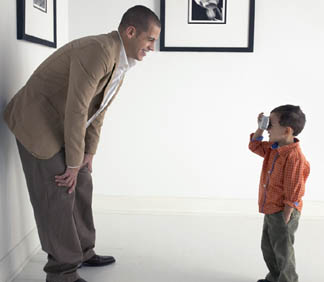by Serge Prengel
Regardless of how little time you actually get to spend with your child, you’re still his father. You may not be a father in the way you want to be, but yours is as real a father-child relationship as any. This is the one and only way that you can have a relationship with this child at this point.
If you try to live up to the image of the all-giving, ever-present father, you are bound to disappoint your child, as well as yourself. You’ll end up being defined by your shortcomings.
It’s easy to spend a lot of time dealing not with the reality of your situation, but with your ideas of how it should be. Life becomes simpler when you accept that reality as a starting point for your actions, as opposed to what should be.
 You no longer take the relationship for granted. You cannot take it for granted that you’ll have unlimited amounts of time—that there will always be time for saying or doing the important things. Now, you have to figure out what’s really important and consciously make sure that it happens.
You no longer take the relationship for granted. You cannot take it for granted that you’ll have unlimited amounts of time—that there will always be time for saying or doing the important things. Now, you have to figure out what’s really important and consciously make sure that it happens.
You are more conscious of the value of this bond, for you have reaffirmed the strength of your commitment in a conscious way and geared your life to this end—the same way as somebody who has been close to death values life even more for knowing how precious it is.
One example of this is in how you express feelings around your child and toward him.
John is trying so hard to be the father he thinks he should be, that his child doesn’t always get to see who he really is. Slowly, he has come to understand that, in order for Joey to know him, he has to let him see more of his feelings and emotions.
This was much harder in the midst of the harshest battles of the divorce. John used to fear (maybe with good reason) that, if he let go of his guard, his raw feelings would come out, and they would be terrifying and destructive to his child.
As John is getting more of a handle on his emotions, he is becoming less afraid of revealing more of them to his child. He is more aware of a middle ground. For instance, when Joey says something that hurts him, he can tell him that he feels hurt. He demonstrates that silence is not the only alternative to uncontrollable pain or destructive anger.
As John keeps revealing more of himself, he feels emotionally closer to his child. He finds it easier to show his love for him—hugging him, telling him he loves him, and in many other ways. He expends less energy keeping a lid on his feelings, so he has more of it to give to his child.
Having a conscious relationship also influences your ability to overcome obstacles in your fathering.
Jim H. says: I can call you in the evening to see how your day went. And his daughter replies: Mom doesn’t let me answer the phone when she knows it’s you.
After a while, father and daughter develop a routine. Jessica now knows that, when the phone rings, unanswered, around 6 in the evening, it’s her father saying hello to her with the ring itself, if not in words.
This poignant example brings up a lot of questions. Why can’t the mother be more cooperative? Shouldn’t she let the child talk to her father?
True, but what can he do about it? What is making a change for Jim and his daughter is that Jim is focused on his goal—staying in contact with his child. He puts his energy toward reaching this goal.
Divorced dads may be even more committed to their children than parents whose right to parent hasn’t been challenged. You certainly would not have chosen this challenge if you had a say in the situation, but you might as well see this as an opportunity to have a more conscious relationship with your child and make the best of it.
–
 Serge Prengel is a life coach who has been working with divorced fathers for nearly 20 years. He is author of the book Still a Dad: The Divorced Father’s Promise.
Serge Prengel is a life coach who has been working with divorced fathers for nearly 20 years. He is author of the book Still a Dad: The Divorced Father’s Promise.

